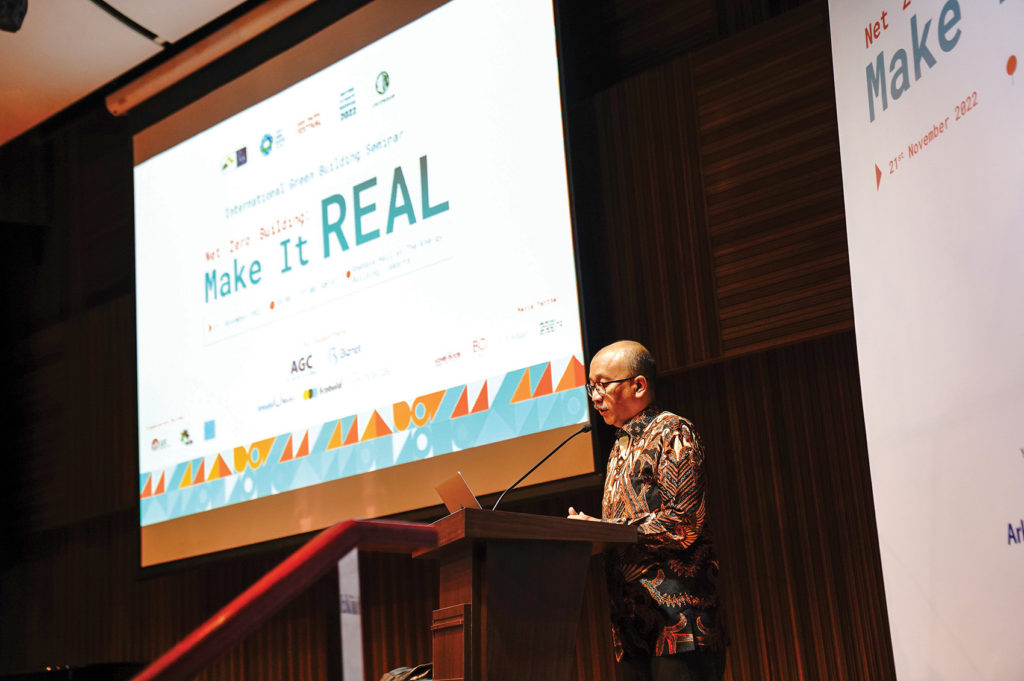1st Quarter 2023
Can Indonesia accelerate the adoption of net zero buildings?
March 21, 2023
According to the Climate Transparency report in 2022, Indonesia is not on track for a 1.5-degree world. The nation’s building sector accounts for a total of 29.1 per cent direct and indirect emissions, which needs to be reduced by 90 per cent by 2050. Is the infrastructure ready to support this decarbonisation, and what will it take to achieve this goal?


Such questions were posed at the international Green building seminar titled Net Zero Building: Make it Real held on 21 November 2022 by Green Building Council (GBC) Indonesia. The seminar took place at Soehanna Hall, The Energy Building—a GREENSHIP certified Gold-rated building—as well as online via Zoom. Speakers were asked to provide guidance on immediate actions to transform the building industry towards becoming more sustainable, share the implementation of net zero buildings from other countries, and discuss potential applications for the Indonesian context.
The event opened with keynote speeches from Iwan Prijanto, Chairperson of GBC Indonesia and Christina Gamboa, CEO of WorldGBC. The first session discussed Zero Operational Energy and Embodied Carbon with Victoria Kate Burrows, Director of Advancing Net Zero, WorldGBC.
Burrows reminded the audience that massive growth in the building sector is expected over the next 40 years, with the building stock doubling by 2060. A majority of the growth will be seen in Southeast Asia and Africa, where it is thus urgent for industry stakeholders to be educated about achieving carbon targets. “It’s always a reduction-first approach,” Burrows summarised. This entails pushing for renewable energy to reduce operational carbon, transitioning away from diesel and fossil-based systems, and offsetting residual emissions over time.
Embodied carbon can be reduced by optimising or renovating existing buildings before choosing to build anew. Designers should also maximise the reusability or adaptability of their structures over time. “Maybe even deconstruct it,” Burrows prompted. “Think of a building as an enormous Lego building: how can the bits be taken apart and reused in other buildings?”

Caroline Aretha, Planner at the National Development Planning Agency, outlined Indonesia’s efforts to achieve net zero. A Green Economic Index has been launched in August 2022, serving as a tool to track sustainable progress across environmental, economic and social criteria. This includes waste management, emission intensity reduction, and increasing life expectancy. The building sector itself plays a key role in achieving energy efficiency targets within the National Medium-Term Development Plan (RPJMN). While there has been a recognition for the importance of Green procurement, Caroline noted that its incentives and disincentives are yet to be defined.
Anggia Murni, landscape architect and Core Founder of GBC Indonesia, cautioned about the upwards trajectory of climate change: “Do you feel how hot it is recently? Maybe one day Jakarta will be 50 degrees Celsius.” She discussed the importance of Nature-based solutions in the session titled Developing Ecological Processes to Accelerate Decarbonisation. Actions such as protecting and restoring forests, conserving marine ecosystems and enhancing the resilience of vulnerable communities have the potential to save up to 10 gigatonnes of carbon dioxide per year—more than the global transportation sector’s total emissions. In closing, Anggia quoted a statement from the COP27 Secretary General: “Let’s not relent in the fight for climate justice and climate ambition.”
Read more stories from FuturArc 1Q 2023: Mobility & Transport!

To read the complete article, get your hardcopy at our online shop/newsstands/major bookstores; subscribe to FuturArc or download the FuturArc App to read the issues!
Previously Published Happening
Contact us at https://www.futurarc.com/contact-us for older articles.
